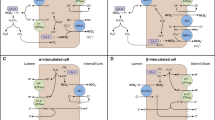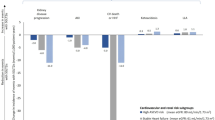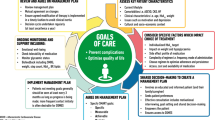Summary
There is a wide variety of diuretic-induced metabolic abnormalities of unequal severity. Renal failure can be caused by excessive sodium loss, or by certain drug combinations comprising, for instance, a nonsteroidal anti-inflammatory drug (NSAID) or an ACE inhibitor. Hyponatraemia is uncommon. It is encountered with thiazides, especially among women. A sodium level less than 120 mmol/L may result in neurological complications. Hypokalaemia is frequent and might increase the risk of cardiac arrhythmia. Hyperkalaemia induced by potassium-sparing diuretics is often combined with another contributive cause. Glucidic, lipidic and uric acid abnormalities are common, but their clinical effects are slight. They do not seem to worsen cardiovascular risks among elderly patients. Nevertheless, prescribing diuretics for elderly patients requires special precautions. Reducing the diuretic dose, as is now recommended for treating hypertension, seems to lessen adverse effects, and despite all the adverse reactions just mentioned, it has been proven that diuretics are beneficial in many diseases.
Similar content being viewed by others
References
Baglin A, Prinseau J, Aegerter P, et al. Anomalies électrolytiques chez les personnes âgées. Prévalence et relation avec le traitement médicamenteux. Etude multicentrique chez 631 sujets de 70 ans et plus. Presse Med 1992; 21: 1459–63
Clive DM, Stoff JS. Renal syndromes associated with non steroidal anti inflammatory drugs. N Engl J Med 1984; 310: 563–72
Bridoux F, Hazzan M, Pallot JL, et al. Acute renal failure after the use of angiotensin—converting-enzyme inhibitiors in patients without renal artery stenosis. Nephrol Dial Transplant 1992; 7: 100–4
Cockroft DW, Gault MH. Prediction of creatinine clearance from serum creatinine. Nephron 1976; 16: 31–41
Siersbaek-Nielsen K, Molholm Hansen J, Kampmann J, et al. Rapid evaluation of creatinine clearance. Lancet 1971; 1: 1133–4
Pentimone F, Del Corso L, Moruzzo D, et al. Sodio e malattie nells’anziano. Clin Ther 1991; 138: 199–205
Sorensen IJ, Matzen LE. Serumelektrolytter og medikamentel behandling hos patienter indlagt pa en geriastrisk afdeling. Ugeskr Laeger 1993; 155: 3921–4
Fichman MP, Vorherr H, Kleeman CR, et al. Diuretic-induced hyponatremia. Ann Intera Med 1971; 75: 853–63
Ashraf N, Locksley R, Arieff AI. Thiazide-induced hyponatremia associated with death or neurologic damage in outpatients. Am J Med 1981; 70: 1163–8
Abramow M, Cogan E. Clinical aspects and pathophysiology of diuretic-induced hyponatremia. Adv Nephrol Necker Hosp 1984; 13: 1–28
Booker JA. Severe symptomatic hyponatremia in elderly out-patients: the role of thiazide therapy and stress. J Am Geriatr Soc 1984; 32: 108–13
Ashouri OS. Severe diuretic-induced hyponatremia in the elderly. A series of eight patients. Arch Intern Med 1986; 146: 1355–7
Friedman E, Shadel M, Halkin H, et al. Thiazide-induced hyponatremia. Reproducibility by single dose rechallenge and an analysis of pathogenesis. Ann Intern Med 1989; 110: 24–30
Sonnenblick M, Friedlander Y, Rosin AJ. Diuretic-induced severe hyponatremia. Review and analysis of 129 reported patients. Chest 1993; 103: 601–6
Cogan E, Abramow M. Diuretic-induced hyponatraemia in elderly hypertensive women. Lancet 1983; 2: 1249
Sterns RH, Riggs JE, Schochet SS. Osmotic demyelination syndrome following correction of hyponatremia. N Engl J Med 1986; 314: 1535–42
Sterns RH. Severe symptomatic hyponatremia: treatment and outcome. A study of 64 cases. Ann Intern Med 1987; 107: 656–64
Ayus JC, Krothapalli RK, Arieff AI. Changing concepts in treatment of severe symptomatic hyponatremia. Rapid correction and possible relation to central pontine myelinolysis. Am J Med 1985; 78: 897–902
Ayus JC, Krothapalli RK, Arieff AI. Treatment of symptomatic hyponatremia and its relation to brain damage. A prospective study. N Engl J Med 1987; 317: 1190–5
Arieff AL Management of hyponatraemia. BMJ 1993; 307: 305–8
Morgan DB, Davidson C. Hypokalaemia and diuretics: an analysis of publications. BMJ 1980; 1: 905–8
Toner JM, Ramsay LE. Thiazide-induced hypokalaemia: prevalence higher in women. Br J Clin Pharmacol 1984; 18: 449–52
Tannen RL. Diuretic-induced hypokalemia. Kidney Int 1985; 28: 988–1000
Whelton PK. Diuretics and arrhythmias in the Medical Research Council Trial. Drugs 1984; 28 Suppl. 1: 54–65
Siscovick DS, Raghunathan TE, Psaty BM, et al. Diuretic therapy for hypertension and the risk of primary cardiac arrest. N Engl J Med 1994; 330: 1852–7
Martin BJ, Milligan K. Diuretic-associated hypomagnesemia in the elderly. Arch Intern Med 1987; 147: 1768–71
Martin BJ, Black J, Mclelland AS. Hypomagnesaemia in elderly hospital admissions: a study of clinical significance. Q J Med 1991; 78: 177–84
Bayer AJ, Farag R, Browne S, et al. Plasma electrolytes in elderly patients taking fixed combination diuretics. Postgrad Med J 1986; 62: 159–62
Greenblatt DJ, Koch-Weser J. Adverse reactions to spironolactone. A report from the Boston Collaborative Drug Surveillance Program. JAMA 1973; 225: 40–3
Rimmer JM, Horn JF, Gennari J. Hyperkalemia as a complication of drug therapy. Arch Intern Med 1987; 147: 867–9
Ponce SP, Jennings AE, Madias NE, et al. Drug-induced hyperkalemia. Medicine 1985; 64: 357–70
Report of Medical Research Council Working Party on mild to moderate hypertension. Adverse reactions to bendrofluazide and propranolol for the treatment of mild hypertension. Lancet 1981; 2: 539–43
Murphy MB, Lewis PJ, Kohner E, et al. Glucose intolerance in hypertensive patients treated with diuretics: a fourteen-year follow-up. Lancet 1982; 2: 1293–5
Amery A, Berthaux P, Bulpitt C, et al. Glucose intolerance during diuretic therapy. Results of Trial by the European Working Party on Hypertension in the Elderly. Lancet 1978; 1: 681–3
Pollare T, Lithell H, Berne C. A comparison of the effects of hydrochlorothiazide and captopril on glucose and lipid metabolism in patients with hypertension. N Engl J Med 1989; 321: 868–73
Ames RP, Hill P. Elevation of serum lipid levels during diuretic therapy of hypertension. Am J Med 1976; 61: 748–57
Helgeland A, Hjermann I, Holme I, et al. Serum triglycerides and serum uric acid in untreated and thiazide-treated patients with mild hypertension. The Oslo Study. Am J Med 1978; 64: 34–8
Grimm Jr HR, Leon AS, Hunninghake DB, et al. Effects of thiazide diuretics on plasma lipids and lipoproteins in mildly hypertensive patients. A double-blind controlled trial. Ann Intern Med 1981; 94: 7–11
Berglund G, Andersson O. Beta-blockers or diuretics in hypertension? A six year follow-up of blood pressure and metabolic side effects. Lancet 1981; 1: 744–7
Carlsen JE, Kober L, Torp-Pedersen C, et al. Relation between dose of bendrofluazide, antihypertensive effect, and adverse biochemical effects. BMJ 1990; 300: 975–8
Ames RP. Metabolic disturbances increasing the risk of coronary heart disease during diuretic-based antihypertensive therapy: lipid alterations and glucose intolerance. Am Heart J 1983; 106: 1207–14
MRC Working Party. Medical Research Council trial of treatment of hypertension in older adults: principal results. BMJ 1992; 304: 405–12
Amery A, Birkenhager W, Brixko P, et al. Mortality and morbidity results from the European Working Party on High Blood Pressure in the Elderly trial. Lancet 1985; 1: 1349–54
Scott JT, Higgens CS. Diuretic induced gout: a multifactorial condition. Ann Rheum Dis 1992; 51: 259–61
Berger L, Yu T. Renal function in gout. IV. An analysis of 524 gouty subjects including long-term follow-up studies. Am J Med 1975; 59: 605–13
Falch DK, Schreiner A. The effect of spironolactone on lipid, glucose and uric acid levels in blood during long term administration of hypertensives. Acta Med Scand 1983; 213: 27–30
Brickman AS, Massry SG, Coburn JW. Changes in serum calcium during treatment with hydrochlorothiazide: studies on mechanism. J Clin Invest 1972; 51: 945–54
Boulard JC, Hanslik T, Alterescu R, et al. Hypercalcémie symptomatique après association vitamine D diurétiques thiazidiques. 2 observations chez des femmes âgées. Presse Med 1994; 23: 96
Author information
Authors and Affiliations
Rights and permissions
About this article
Cite this article
Baglin, A., Boulard, JC., Hanslik, T. et al. Metabolic Adverse Reactions to Diuretics. Drug-Safety 12, 161–167 (1995). https://doi.org/10.2165/00002018-199512030-00002
Published:
Issue Date:
DOI: https://doi.org/10.2165/00002018-199512030-00002




